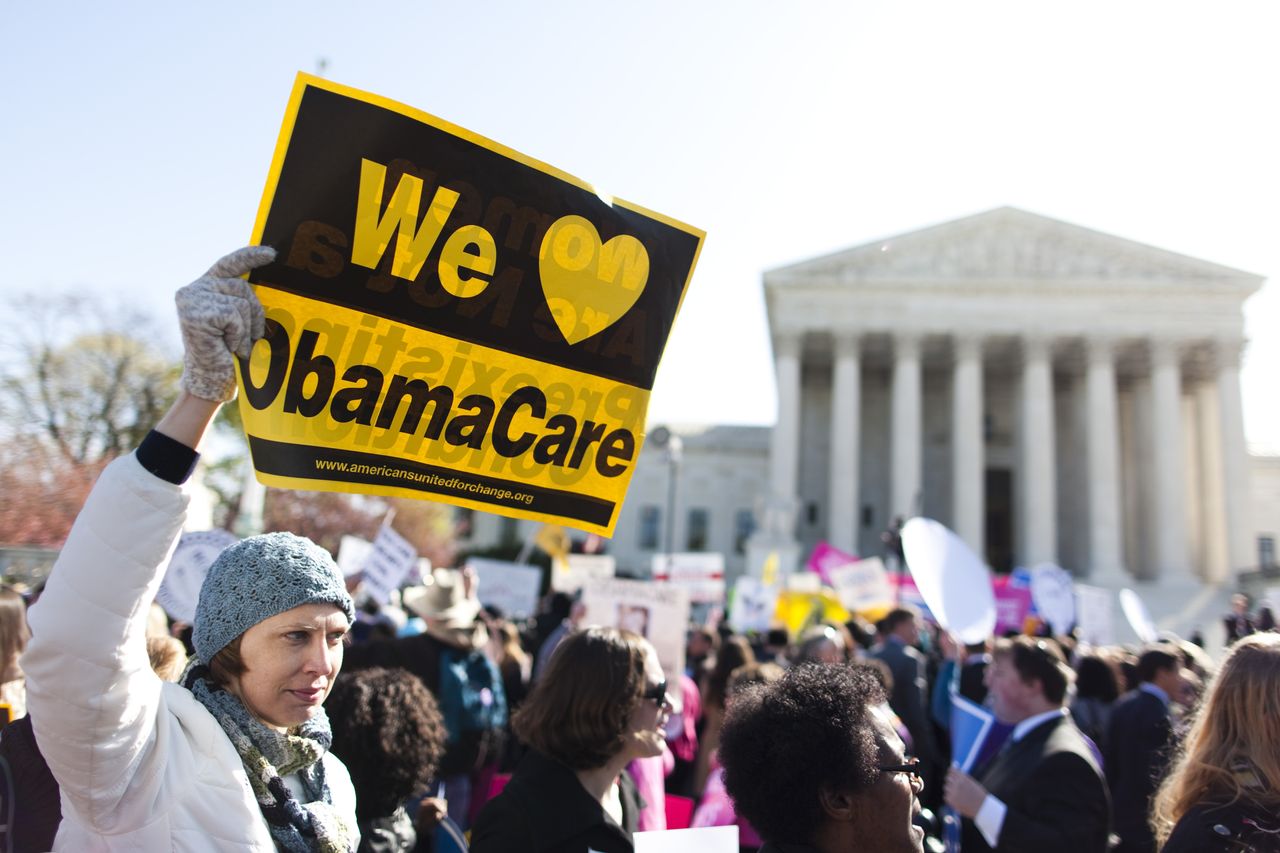The conservative case for the Supreme Court to uphold ObamaCare
It's all about protecting the rights of states


The latest legal challenge to ObamaCare, for which the Supreme Court will hear oral arguments this week, has been roundly condemned for relying on a spurious reading of the law's intent. But here's another reason the high court should reject the challengers' claims: to protect states' rights.
That's the argument raised by a group of law professors and non-profit organizations in a brief (which I advised on) filed with the court.
In King v. Burwell, challengers to the implementation of the Affordable Care Act argue that the statute's language only allows the federal government to provide subsidies to help individuals purchase insurance in states that have established their own health exchanges. Because only 14 states have done so, this threatens to wrench subsidies from millions of Americans, likely leaving most unable to afford insurance.
Subscribe to The Week
Escape your echo chamber. Get the facts behind the news, plus analysis from multiple perspectives.

Sign up for The Week's Free Newsletters
From our morning news briefing to a weekly Good News Newsletter, get the best of The Week delivered directly to your inbox.
From our morning news briefing to a weekly Good News Newsletter, get the best of The Week delivered directly to your inbox.
But the challengers' interpretation of the law also redefines the relationship between the federal and state governments in unprecedentedly draconian terms. Under their view, Congress attempted to prod states to create health exchanges in two ways. First, Congress threatened to withhold subsidies from states that refuse to cooperate with creating exchanges.
Second, and more significantly, the challengers' theory entails that Congress threatened states with utter devastation of their insurance markets if they failed to create exchanges. This follows from the very structure of the ACA. If subsidies became unavailable in certain states, the law would render the individual and employer mandates virtually inoperative there. But these states would still be subject to requirements preventing insurers from denying coverage or charging higher premiums based on an individual's preexisting condition.
This environment would wreck state insurance markets. It's the exact recipe for an insurance market death spiral: individuals would wait to purchase insurance until becoming sick, making insurance pools sicker and costlier, which would cause premiums to jump. High premiums would cause the healthiest cohort to take their chances by dropping insurance, making insurance pools sicker and costlier still, sending premiums even higher. This cycle would culminate in a moribund insurance market, as insurers would stop selling individual policies under these conditions.
So the challengers' interpretation of the law means that Congress attempted to make a grave threat against the states. This threat, as the brief puts it, amounts to: "Establish an exchange, or the federal government will destroy your individual health insurance market."
This kind of punitive federalism is highly problematic under a pair of constitutional principles that protect the states from federal overreach. For one thing, it may well run afoul of the principle that Congress must treat the states as equals. In 2013, the Supreme Court invalidated a key piece of the Voting Rights Act that had subjected some states — those with particularly bad histories of discrimination — to strict federal oversight of their election laws, while exempting others. This violated the "fundamental principle of equal sovereignty among the States," the Court held. The challengers' interpretation of the ACA in King leads to similar unequal treatment, subjecting states to either of two radically different regulatory systems depending on whether or not they create health exchanges.
The challengers' argument may also offend the principle that Congress may not coerce the states. In 2012, the Supreme Court struck down the ACA's mandatory Medicaid expansion. The court determined that Congress had threatened states with losing all Medicaid funding if they refused to expand the program, and that this threat unconstitutionally pointed a "gun to the head" of the states.
The challengers' reading of the law may leave the states in a similarly coercive environment. States would face both a massive loss of federal subsidies and the imminent destruction of their insurance markets if they defy the will of Congress. They would have little meaningful freedom to choose given the magnitude of these threats.
So the challengers' version of the ACA raises stark constitutional problems — and this is a major strike against the validity of their argument. Under the principle of constitutional avoidance, courts are cautioned to disfavor interpretations of laws that raise constitutional problems. As Chief Justice John Roberts told us in 2012, "Every reasonable construction must be resorted to, in order to save a statute from unconstitutionality."
This means that the court should read the ACA as the Obama administration does: to treat all states equally without hinging insurance subsidies on the establishment of health exchanges. This avoids any problems of coercion or disparate treatment. And it would preserve insurance subsidies for millions of Americans, regardless of what state they live in.
It may come as a surprise that a traditionally conservative domain like states' rights can be marshaled to reinforce President Obama's signature achievement. But this simply brings us full circle to the law's conservative roots: a vision of reform built on competitive private insurance markets that grew from Heritage Foundation policy papers to enactment in Massachusetts under Gov. Mitt Romney.
The challengers in King v. Burwell want the court to recognize a vision of federal health reform that threatens and punishes the states. Rejecting this challenge, and keeping insurance subsidies available in all states, would thus be a resounding victory for states' rights.
Sign up for Today's Best Articles in your inbox
A free daily email with the biggest news stories of the day – and the best features from TheWeek.com
Joel Dodge writes about politics, law, and domestic policy for The Week and at his blog. He is a member of the Boston University School of Law's class of 2014.
-
 America's academic brain drain has begun
America's academic brain drain has begunIN THE SPOTLIGHT As the Trump administration targets universities and teachers, educators are eying greener academic pastures elsewhere — and other nations are starting to take notice
By Rafi Schwartz, The Week US Published
-
 Why is Musk targeting a Wisconsin Supreme Court race?
Why is Musk targeting a Wisconsin Supreme Court race?Today's Big Question His money could help conservatives, but it could also produce a Democratic backlash
By Joel Mathis, The Week US Published
-
 How to pay off student loans
How to pay off student loansThe explainer Don't just settle for the default repayment plan
By Becca Stanek, The Week US Published
